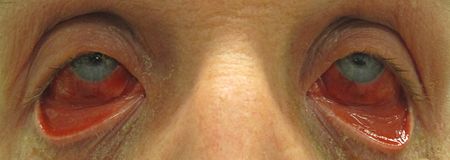
NASA / Neil A. Armstrong, Public domain, via Wikimedia Commons
Did you ever wonder why haemorrhagic conjunctivitis is popularly called “Apollo”? Well, it has nothing to do with the Greek God Apollo.
Interestingly, the disease was first recognized in Ghana, a country in West Africa at the time when the Apollo XI spacecraft was launched by the United States National Aeronautics and Space Administration(NASA).
In July 1969 the astronauts Neil Armstrong and Buzz Aldrin exited the Apollo 11 space ship and walked on the surface of the moon. When they returned, the astronauts brought back lunar rock and soil samples along with them.
Around this time in Accra, capital of Ghana, there was an outbreak of acute haemorrhagic conjunctivitis.
The conjunctivitis was nicknamed Apollo 11 disease as it coincided with the time of the Apollo landing on the moon. It was believed that the soil samples brought from the moon in Apollo 11 had some lunar germs that caused the disease.
A few years later the 11 in the apollo disappeared and the conjunctivitis infection was stilled called the apollo disease.
Acute haemorrhagic conjunctivitis (AHC), a benign infection is also commonly called as ‘pink eye‘.
About Acute haemorrhagic conjunctivitis (AHC)

Acute hemorrhagic conjunctivitis with the eyelid pulled down. Source: Wikipedia
Acute hemorrhagic conjunctivitis (AHC) is a derivative of the highly contagious conjunctivitis virus and is characterized by sudden onset of painful, swollen, red eyes and excessive tearing. Symptoms include subconjunctival haemorrhaging.
Currently, there is no known treatment for AHC. Although patients may not be able to work for a few days, they can expect complete recovery in 1-2 weeks with only supportive care.
AHC is highly contagious and epidemics of AHC are very common in developing countries such as China, India, Japan, Brazil, and Cuba.
It is very important for patients to maintain personal hygiene and avoid close personal contact with others when infected.
Sign up for the QuackTrack.org newsletter below!













